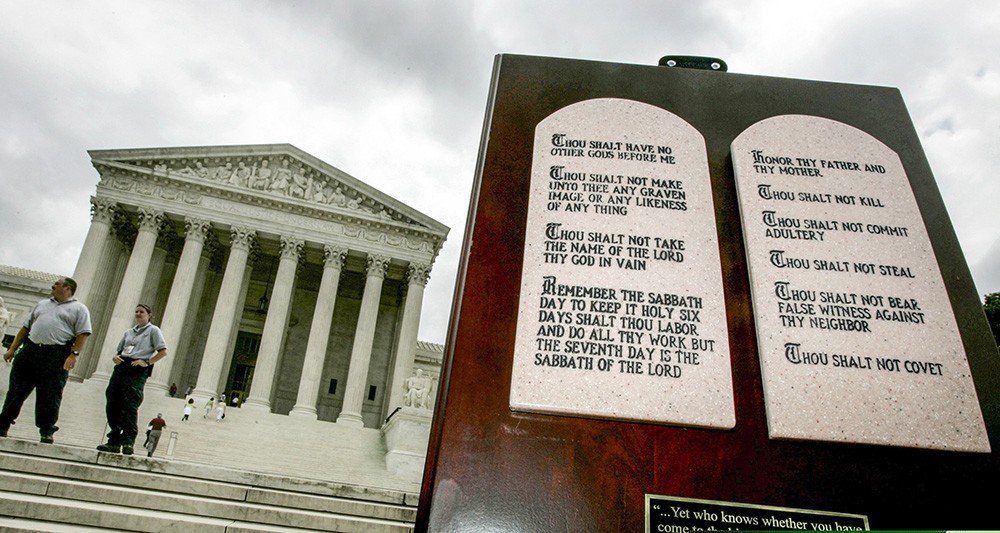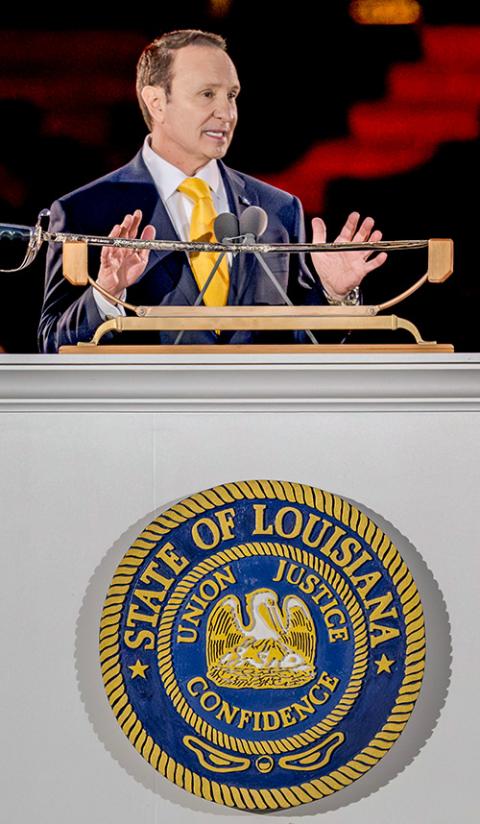
Stone tablets depicting the Ten Commandments are shown outside the Supreme Court in Washington June 27, 2005, placed there during a vigil by a religious group. A federal judge ruled Nov. 12. 2024, that Louisiana's law requiring public schools to display the Ten Commandments is unconstitutional. (OSV News/Reuters/Jason Reed)
When I heard the news about Louisiana Gov. Jeff Landry signing into law legislation that mandated the Ten Commandments be posted in every public classroom in the state, from elementary school up through state colleges, the first person I thought of was my friend David Golemboski.
A political theorist who earned his doctorate at Georgetown University's Department of Government and current associate professor of government and international affairs at Augustana University in Sioux Falls, South Dakota, David has long been interested in questions related to the intersection of religion and politics, especially through the lens of Catholic social thought.
David and I met almost 20 years ago in Europe at a conference on the life and work of Thomas Merton, a shared passion, and we have been close friends ever since. While I enjoy discussing all sorts of things with him, I was especially eager to talk with him about this situation in Louisiana and I thought NCR readers might be interested in our conversation, too.
The following interview has been lightly edited for length and clarity.
Horan: When news broke last week that Gov. Landry signed this new legislation into law, I was stunned. It seemed to me like a blatant violation of the U.S. Constitution's "establishment clause" in the First Amendment. Am I correct in thinking that? What was your first reaction to this new law?
Golemboski: Well, in 1980, the Supreme Court had exactly the reaction that you did. In a case called Stone v. Graham, the court struck down a law from Kentucky that was basically identical to the new Louisiana law. They said that the requirement to post the Ten Commandments in public school classrooms served no legitimate secular purpose, but was instead designed to advance a religious objective — and this violated the establishment clause.
'Assuming that a challenge to this law makes it to the Supreme Court, it will really test the limits of just how permissive the current court is willing to be.'
So, my first reaction to this law is that the Louisiana legislature and governor are clearly trying to test that precedent, essentially daring the Supreme Court to overturn it.
The challenge is that the language of the establishment clause in the First Amendment is very ambiguous: All it says is that the government is prohibited from "respecting an establishment of religion."
What exactly that means is open to interpretation, and Louisiana has clearly noticed that the current Supreme Court takes a much more permissive interpretation of those words than the court did in previous decades. Assuming that a challenge to this law makes it to the Supreme Court, it will really test the limits of just how permissive the current court is willing to be.
It's clear from the governor's brash remark that he "can't wait to be sued," that he wants this to go through the courts. What do you see as the potential consequences of a possible Supreme Court decision upholding the Louisiana law?
The most immediate consequence would be expanded latitude for the infusion of religion and religious symbols into public education. This is an area where other states have also been pushing.
For instance, Florida's governor, Ron DeSantis, recently signed legislation allowing public schools to appoint volunteer chaplains. My own state of South Dakota enacted a law several years ago requiring all schools to display the motto "In God We Trust."
These efforts gained steam following a 2022 Supreme Court ruling that affirmed a high school football coach's right to engage in prayer with students on the field after games. If the court upholds the Louisiana law, proponents of religion in schools will be further emboldened. It would not surprise me if, for instance, some states took steps to reintroduce prayer into the classroom.
More broadly, a ruling to uphold the Ten Commandments law would continue a trajectory of weakening the establishment clause that the Supreme Court has been on for at least the past few decades. At every turn, on issues from religious displays on public grounds to legislative prayer to state funding for religious entities, the court has turned away from the "wall of separation" approach that was previously more influential in establishment clause law. A ruling in favor of the Louisiana law would extend this shift in a dramatic way.
As someone who has written about religious pluralism, political stability and the relationship between law and religion in the United States, what do you think this sort of effort to blur the separation of "church and state" means for our current political and social climate?
Attempting to keep religion and government separate is an inherently complex enterprise in the United States, because religion has always been an important part of American public culture. In a government "of, by and for" the people, the people's religious beliefs and practices will inevitably intersect with politics and law.
That said, there are a number of important reasons to enforce limits on the influence of religion over government.
'Resistance to Christian nationalism must come from within the Christian community.'
First is protecting the religious rights of minority faiths. It's no secret that the symbols most frequently represented in public displays are Christian symbols. The religious entities that most often benefit from public funding are Christian ones. When government becomes too closely associated with a single religion, it threatens to undermine the religious freedom of adherents of other faiths.
Second is upholding the principle that government is for all its citizens, and that equal standing under the law does not depend on being of the "right" religion.
Third is a priority that many religious conservatives tend to forget: safeguarding against the corrupting influence that government can have on religion when the two are too closely aligned. For religion to maintain its own dignity, it must protect its autonomy from government.
All of that notwithstanding, there is an energetic and well-funded movement on the political right to infuse Christian religiosity into all facets of government, and this movement takes great encouragement from the Supreme Court's ongoing erosion of the establishment clause.
Politically engaged religion has been an important part of American political history — including in movements for liberation and justice, from the abolition of slavery to women's suffrage to the Civil Rights Movement to immigration justice in the present day — but I worry that the elements of Christian nationalism on the contemporary right threaten to undermine the basic values of secular government.

Louisiana Republican Gov. Jeff Landry speaks during his inauguration ceremony at the State Capitol building in Baton Rouge Jan. 7. (AP/Matthew Hinton)
The last point you raised about Christian nationalism is particularly troubling. According to a June 21 New York Times article, Gov. Landry sees Louisiana as paving the way for a nationwide shift in the direction you're describing. What, if anything, do you think can be done about preventing this?
One possibility is that the Supreme Court will assert some establishment clause limits on government alignment with religion. While the court has moved the law dramatically to the right in recent years, especially in cases dealing with religion, we have seen even conservative justices pull back on the reins at times (for example, in a recent ruling on gun regulation). They may well do the same with the Ten Commandments or these other challenges to establishment clause principles.
Ultimately, though, resistance to Christian nationalism must come from within the Christian community. Christians can vote for candidates who draw on their faith in ways that show respect for the diversity of religious and nonreligious perspectives in our pluralist democracy.
There are examples on both sides of the aisle: Sens. Raphael Warnock and Mitt Romney are two that come to mind.
Christians can model dialogue with people of other faiths, seeking understanding and common ground. And Christians can demonstrate their commitment to genuine religious liberty by speaking up for non-Christians and other marginalized groups whose rights are threatened, both in the U.S. and abroad.
Finally, given that the primary readership of NCR is Catholic, I am wondering what thoughts or advice you have for American Catholics. It wasn't lost on me that Gov. Landry is Catholic. There may be some readers who think like him. What might you say to them?
As I say, Catholic teaching has always emphasized the relevance of faith to politics, but just as important is the idea of what is sometimes called the autonomy of the temporal order: the independence of the state from control by any particular religious system or authority.
As Pope Benedict XVI put it, it is not the church's responsibility to make its teachings prevail in political life. The church left theocracy behind long ago.
Instead, it is the job of Catholics today to work for the common good in collaboration with our fellow citizens, on the basis of values that we all can share, regardless of religious outlook.









